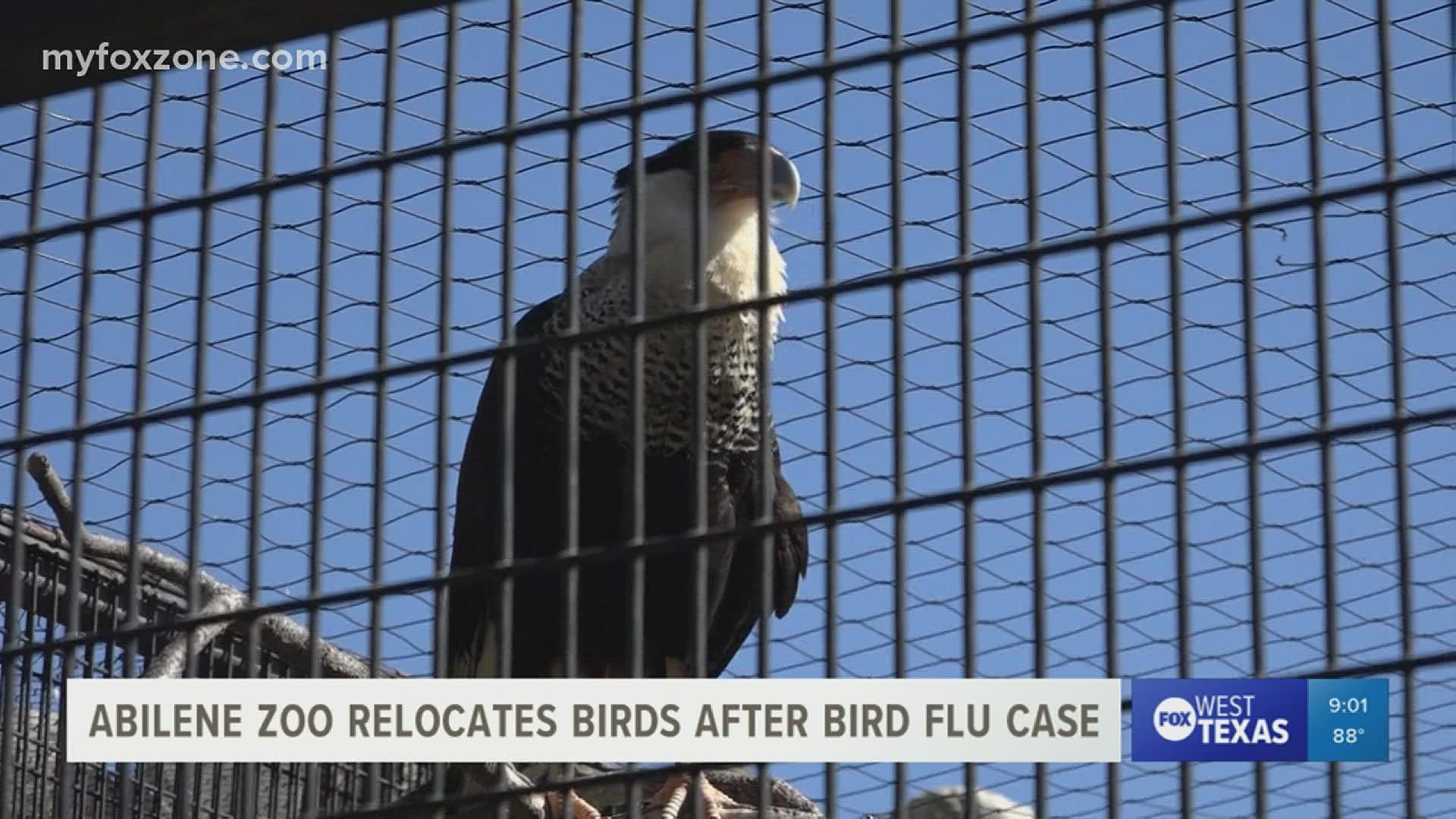ABILENE, Texas — UPDATE (April 27): The Abilene Zoo announced in a press release that its bird collection will be back on exhibit Wednesday.
The total relocation of the bird collection on April 4 was made to better protect them from threats brought upon by high pathogenic avian influenza (HPAI). Since the initial detection in Erath County by the United States Department of Agriculture’s Animal and Plant Health Inspection Service on April 3, Texas has received no further positive cases reported, the zoo said in a release.
There are new cases being reported, but they have been isolated to the midwest and northern Rocky Mountain states. The Texas Animal Health Commission requires a 14-day period after detection to quarantine collections, keeping them safe from external infection risks.
The zoo chose to maintain its protocols for 21 days as an added measure of safety. It followed all protocols and had no reported cases at the Abilene Zoo or in any county in Texas since April 3.
The zoo start bringing members of its bird collection back on to exhibit starting Wednesday April 27. With the added time it extended its quarantine and monitoring all factors, the zoo believes the risk of exposure to be low.
“We will continue to monitor the situation closely and keep welfare at the forefront of every decision,” Dr. Stephanie Carle, Abilene Zoo Senior Veterinarian, said in the release. “At this time our team has made the decision to bring our flock back out onto public display.”
The zoo said it will continue to take precautionary measures with species that are highly susceptible to HPAI, such as chickens, turkey, geese, swans and ducks and will take additional precautions with personal protective equipment (PPE) and other strategies to mitigate risk to the birds.
The zoo consistently surveys zoo and wild birds for the disease and there have been no positive results for HPAI to date. Abilene Zoo leadership and its veterinary team will continue to monitor the situation and make additional decisions if the outbreak resurfaces in Texas.
ORIGINAL STORY: After a case of the avian influenza, a viral respiratory disease found in birds, was reported in Erath County Sunday, the Abilene Zoo said it is taking precautionary measures in line with other animal care facilities to the north and in Texas.
The zoo said in a press release it has been closely monitoring the recent outbreak of avian influenza. The virus has now been documented in Erath County, and reported by the United States Department of Agriculture’s Animal and Plant Health Inspection Service.
The release said the zoo is taking immediate steps to protect the birds in its care from this disease including removing some birds from outdoor habitats where the risk of exposure to wild birds is elevated and halting its wild bird feeding stations, to reduce the number of wild birds in or around the zoo.
The severity of avian influenza can range from a mild infection to a much more acute, contagious illness that can be fatal to birds, the release said. Wild birds, especially ducks and geese, are natural carriers of influenza type A viruses and generally have no illness.
However, under certain circumstances, certain strains such as the current H5N1 subtype, cause outbreaks in wild birds and can have devastating effects. The virus is predominantly transmitted through direct bird-to bird contact and the risks to humans are small.
Texas Tech University Public Health associate professor/associate dean Julie St. John said people can still take precautionary measures to keep that from happening.
“When you're cooking poultry, eggs or chicken at recommended temperatures, cook them at at least 165 degrees. Do this to make sure that you’re killing any unwanted potential viruses. There is that chance that if you touch something and then you touch your face, your mouth or you inhale something, you could get sick. But if you wash your hands regularly as well as stay away from dead animals you may see, that should mitigate that risk significantly,” St. John said.
As a precaution, for the health and well-being of its birds, the zoo is relocating those that may potentially have direct contact with wild waterfowl to behind-the-scenes areas where they are more protected. Those include geese, whooping cranes, marabou storks, African crowned cranes, flamingos and other members of its bird collection.
"We will also be taking additional precautions with personal protective equipment (PPE) and other strategies to mitigate risk to the birds. The zoo consistently surveys Zoo and wild birds for this disease and there have been no positive results for HPAI to date. Abilene Zoo leadership and our veterinary team will continue to monitor the situation and make additional decisions as the outbreak continues. Though we don’t have a specific timeline for how long this will endure, we hope that all birds will be back in their outdoor habitats this summer," the release said.
The bird rehabilitation center at the zoo will continue to operate as the adjustments are made.

